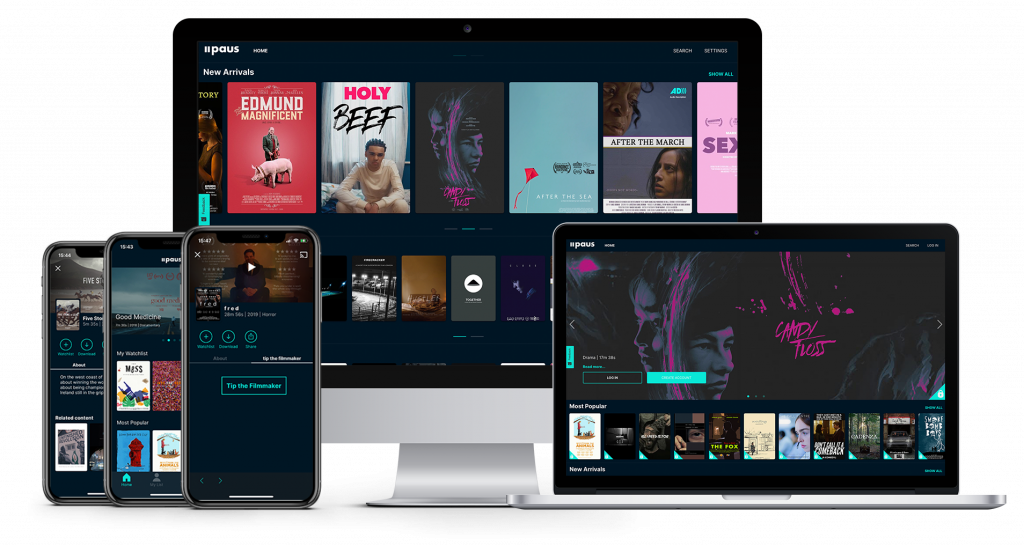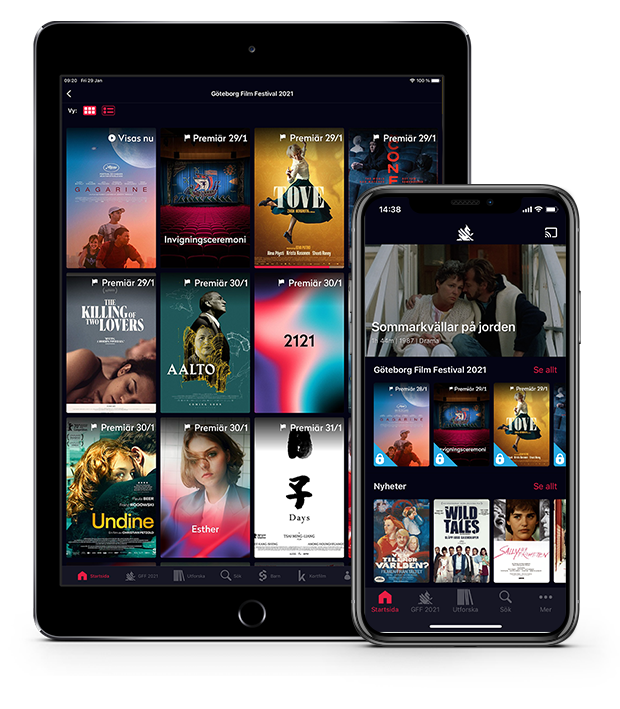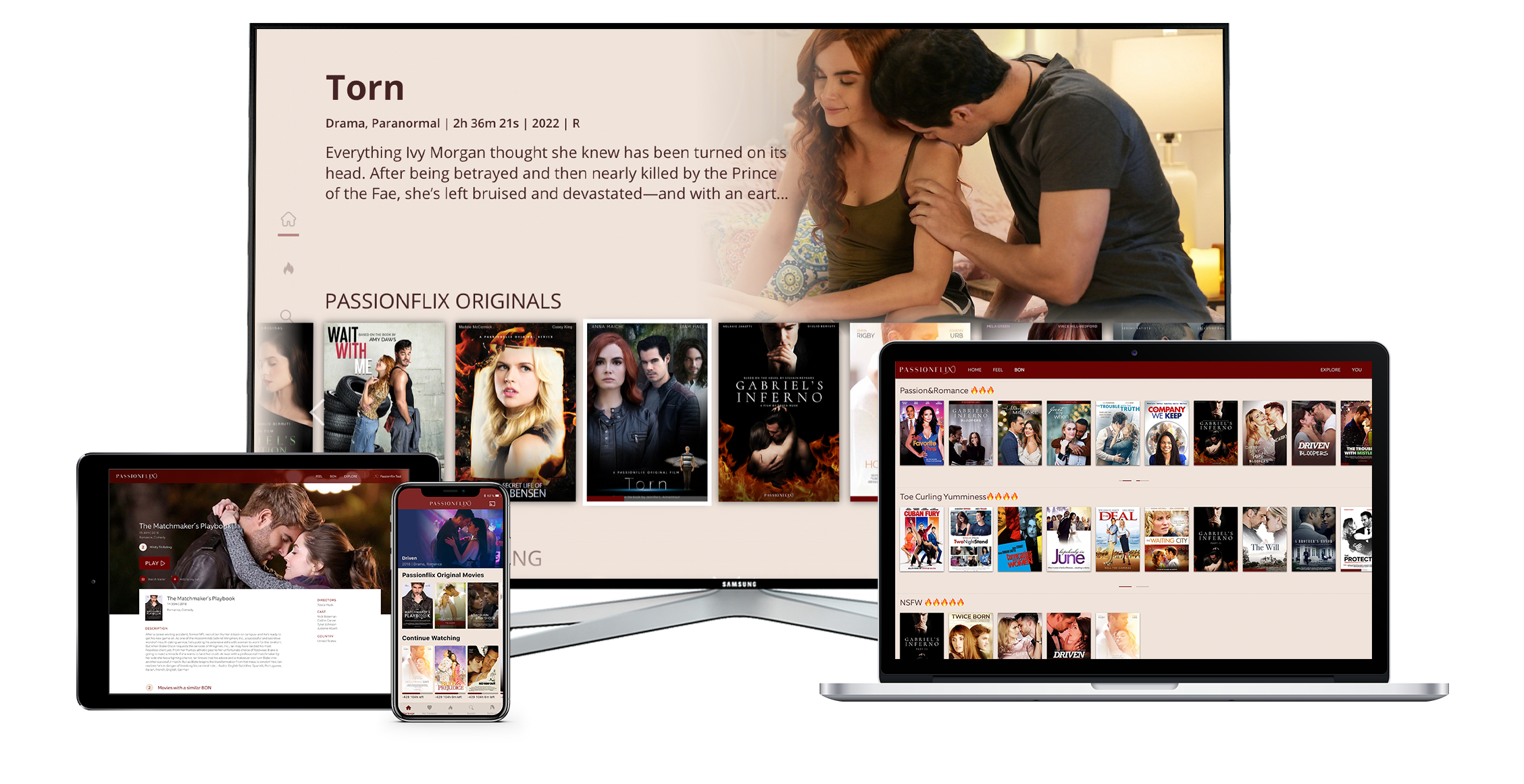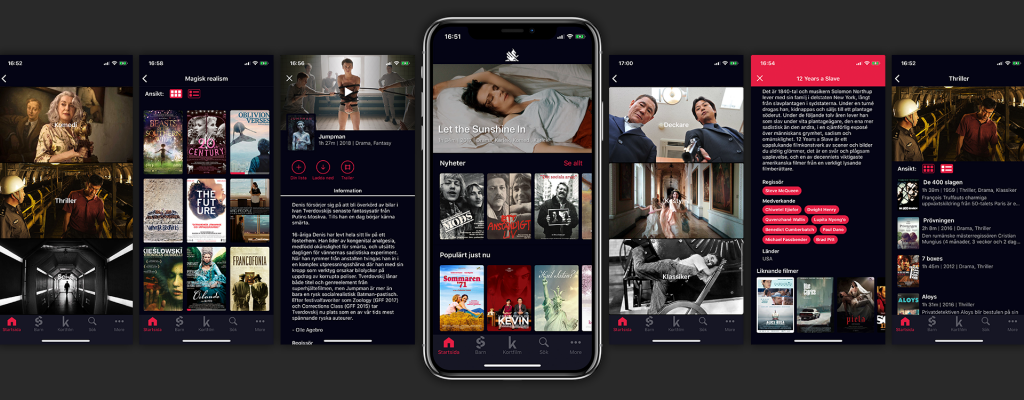Q&A: Tosca Musk, founder of Passionflix on the romance-themed streaming service

Passionflix is a premium romance-on-demand streaming service that’s home to a library of classic romantic content and original movies and series adapted from bestselling romance books. The unique service was founded in 2017 by film director and producer Tosca Musk and launched worldwide via the Magine Pro platform.
Passionflix is accessible via the web, mobile devices supporting iOS and Android, and the big screen. Subscribers can stream via the TV through Roku, Chromecast, Amazon Fire TV, Apple TV, Android TV-supported televisions, and dedicated Smart TV apps for Samsung, LG, and, more recently, Vizio.
We spoke with founder Tosca Musk about the realities of launching a video streaming service, strategies to aid discovery and reduce churn, and the importance of expanding onto multiple devices, including big-screen today.
What inspired the creation of Passionflix?
We wanted to turn best-selling romance novels into movies and series but there was nowhere to release them because they were considered too risqué, so we created our own platform.
Who is your target audience, and what are your key marketing strategies?
Our target audience is romance readers from ages 18-99. And social media marketing has been one of the most powerful tools for Passionflix when it comes to brand awareness and growth.
In addition to creating engaging content that highlights our original films and series, we also create and participate in conversations among the romance reader community. The authors of our adaptations also play a significant role in our marketing efforts, introducing Passionflix to the fanbase they’ve already established. We also run advertising campaigns throughout the year to build brand awareness and drive potential subscribers to specific titles.
How important is it to Passionflix to be available to audiences through the big screen?
As we want Passionflix to become a household name, it’s important to be available on as many devices as possible. Anytime Passionflix becomes available on a new device like Roku or Vizio, we see an increase in subscribers.
What advice would you give others considering launching a video streaming service? And what are your long-term growth plans?
Find a great white-label streaming platform like Magine Pro to support your specific vision. Also, understand your niche and remain laser-focused on that. Our goal is for Passionflix to become a household name. I want to see it in every home worldwide, and Magine Pro will be key in helping us secure the distribution.
Learn more about our partnership with Passionflix within our case study. And download the white paper; Go big or stay small? Why the Smart TV experience is essential for online streaming services now, to find out more about how we enable our partners like Passionflix to expand on multiple devices, including the big screen. Within the white paper, we discuss why offering native Smart TV apps is essential for online streaming services and dive into the complexities of building TV apps.
Head over to our homepage to find out more about Magine Pro’s extensive library of technical resources and experienced team that enable our partners to deliver seamless streaming experiences on all devices, including the big screen. You can also check out our experience page to learn more about our partners.
Don’t forget to subscribe to the Magine Pro e-newsletter to stay up-to-date with our latest news, partners, and products and discover which industry events we’ll be attending next.
Q&A: Rishi Kapoor, founder of paus, shares an insight into the unique streaming service

Rishi Kapoor is an experienced professional in film distribution both UK and Internationally. A former executive at Sony Pictures, Universal
Studios, Warner Bros. and Disney. After many years working on distribution deals with Netflix, Amazon and Apple, he turned his attention to the independent film space, supporting independent filmmakers at paus.tv.
What’s the origin of paus? And what did you set out to achieve at the beginning?
Having worked in the commercial space for such a long time with big brands, I felt content was becoming increasingly commoditized and manufactured. And as a film enthusiast, I could see the authenticity being lost because the models weren’t there to support content that had smaller audiences. If you’re Netflix, for example, spending billions of dollars on content, you have to make content with mass appeal, which means many fantastic stories that may not attract millions of people just get lost. So I wanted to solve a problem for niche content that wasn’t being solved as the traditional model of one-size-fits-all didn’t fit all.
What was the inspiration behind the paus’ unique tipping feature? And how does revenue share with independent filmmakers work?
In my opinion, no model was fair for creators and audiences. The free ad-based model can require lots of traction for any meaningful revenue to be earned. And at the same time, there was a rise in this creator economy. Creators were moving online to target their audience directly and monetize without involving a distributor or sales agent or getting a deal with a big streaming service. I was particularly inspired by other creative economy platforms such as Patreon and OnlyFans. They were solving this issue but for other industries and creators, such as influencers and musicians. They proved that people want to support the creators they like and inspired the tipping model for paus.
At paus, filmmakers take 80% of the revenue, and we keep 20%. The feature is fully integrated and seamless on the platform. For example, if someone watches a film in London on paus and opts to tip, the filmmaker in New York will receive their share within minutes. Interestingly, Twitter, Snapchat and Clubhouse have also both recently launched their own tipping feature. So I think we may soon see a shift in how the internet is monetized with more direct-to-consumer payment models supporting creators.

For content owners, it’s really easy to get drowned out on a one-size-fits-all platform, like Amazon Prime, where you have independent films sitting alongside blockbusters such as Jurassic World.
The paus model gives more back to the filmmakers. So yes, it’s tipping, but it’s coupled with a platform that’s free to use and is a dedicated space for independent film. I believe the paus model and the exposure from a dedicated platform are two things that drive creators to our platform.
What are paus’ long-term growth plans? And how does a platform provider like Magine Pro enable you to meet those goals?
We want to work with more filmmakers around the world and provide them with more tools to be able to monetize. We’re not just a tipping platform; we want to do other things, integrating merchandise, ticketed events and anything that creates a fair reward for filmmakers to monetize from their fans. Magine Pro lets us focus our money and attention on the filmmakers and our marketing efforts and spend less time worrying about creating a world-class streaming service in-house. They have given us the foundation and infrastructure to focus on serving the creative community much better.
_____________________________________________________________________________________________________
Read the Q&A with Rishi Kapoor in full in our latest white paper, OTT Discovery: How to stand out amongst the crowd and learn more about how paus’ unique tipping feature has impacted their marketing efforts and the discoverability of the service. Rishi also offers those considering starting their own streaming service.
To find out more about paus, an independent film service that is uniquely powered by tips, check out our case study. For more information on Magine Pro’s OTT solutions and services, head here.
Q&A: Draken Film’s, Olle Agebro on operating during a pandemic & the future of OTT streaming
We recently caught up with Olle Agebro, Head of Acquisition at Draken Film, to learn more about the origins of Draken Film, the impact of Covid-19, and Olle’s thoughts on current OTT industry trends. We also discuss recent projects, including revenue share with Swedish Independent Cinemas and bringing the annual Göteborg Film Festival’s experience online through Draken Film.

What’s the origin of Draken Film? And what did you set out to achieve at the beginning?
Our mission at Draken Film mirrors Göteborg Film Festival’s, which is to bring niche films to as large an audience as possible. The festival itself is based in Göteborg and takes place every year over the course of a week. When Draken Film was founded in 2014, it was to bring those films screened at the festival to wider audiences in Sweden and the Nordics year-round. The film festival is now in its 44th year, and I think Draken Film is one of the few places where really niche films can actually find an audience.
Over the last couple of years, how have you seen your OTT offering develop? Have you shifted your content strategy in any way?
When we started, we had the idea of bringing really niche films to a wider audience, and we really focused on that.
We also have our own film fund, where we support films that wouldn’t have a chance of being produced otherwise. And when Draken Film was launched, we had fewer film titles, but all were unique and couldn’t be found anywhere else.
Over the last couple of years, we realised that to bring even those films to a wider audience, we also needed to offer more commercial films alongside. So we now have mixed our catalogue with both niche titles and award-winning commercial films and have found a good balance.
Do you think delivering niche content can be a viable OTT business model?
It’s taken a while to grow our monthly subscribers, and we’re a small team, but today we’re profitable. I think you can be profitable with small subscriber numbers; it’s actually more about finding ways to make small teams and organisations work. The Magine Pro product is a really great example of that, and I’m surprised we haven’t seen more niche platforms as it can be a great business model.
COVID has been extraordinarily challenging for the industry. What are your insights and takeaways over the past year? And how did you react to the changes?
We’ve seen significant growth in subscriber numbers since January 2020. When the pandemic hit last March, we launched initiatives to support Swedish Independent Cinemas that had to either operate with much smaller audiences or close entirely. We offered new subscribers to Draken Film to pick a cinema they would like to support, and we shared revenue from those new subscribers with the cinemas. That initiative became quite successful, and it led to press and PR that helped increase our subscriber numbers last spring.
What was really important was that all those independent cinemas had a really great relationship with their own local audiences. When they communicated to them that they had to close but could recommend subscribing to Draken Film, that really built trust. The audiences trusted that Draken Film would serve the same purpose as their local cinemas and supported them.

Göteborg Film Festival on Draken Film
What impact has the pandemic had on the annual Göteborg Film Festival? How did COVID restrictions impact the planning and execution of the event?
Göteborg Film Festival is the largest film festival in the Nordics, and we typically have an audience of around 130,000 every year. We screen around 400 films at 20 cinemas in Göteborg. At the beginning of last year, we were scouting for films for this year’s festival (2021), but as more events and festivals cancelled, we realised we needed to plan for a hybrid or digital alternative. We set about trying to figure out a way to do a smaller physical event (700 seat cinema) that Draken Film supported with some digital screenings. However, as restrictions increased, we realised it would be tough to achieve, so we decided to bring the festival experience online through Draken Film entirely. That being said, we also screened every single film at the Draken cinema below our office for one person, so I guess it was a hybrid film festival. We also built a one-person cinema at a lighthouse in the Göteborg Archipelago, where a nurse was isolated for the entire week and watched all 70 films.
How much of a risk was it to pivot the festival from a traditional event to it being hosted digitally on Draken Film?
Yes, it was a risk. For a typical festival, we sell single tickets for each screening. Ticket sales are our most important revenue, and it happens for only one single week a year. So it’s essential for us, and when we risked selling those films in a package with a digital festival pass, we didn’t know what to expect. Fortunately, we sold more than we had anticipated, but we still had no idea how successful it would be – both the digital pass idea and the pricing. No one has sold a film festival in this way before, so it was a big risk.
What are your insights from working with the distributors on the digital film festival?
For distributors, it was actually quite risky to put their films on a digital platform. Many distributors were concerned they wouldn’t be able to get their films released in cinemas if they had already had their digital premiere. Typically a film premieres at cinemas for three or four months before it is released on VOD.
As we couldn’t offer a normal screening fee, we instead offered a revenue share where most distributors received a fee for every stream. This actually became quite interesting because some films suddenly had the potential to make money during a year when everyone’s expectations were zero.
We were also able to cap films with a 24-hour availability window, so every film had a fixed viewing time. A festival pass didn’t mean audiences were able to watch every film, whenever they wanted.
We had a few tough weeks of negotiating with distributors. Still, I think we ended up with a result everyone was quite happy with, both from the distributor and audience perspective.
We’re seeing a digital transition for cinemas and film festivals. Do you see this as a permanent shift or just temporary?
I believe it is a permanent shift. People will definitely go back to cinemas but will continue to stream more films at home than before.
Cinemas and film festivals that will be successful over the next couple of years will combine the digital experiences with the theatrical. And I think many cinemas could become better at programming films that respond to streaming trends rather than just following the release schedule set by distributors. I think if cinemas are smart, they can actually benefit from the increased interest in watching films at home.
Series/episodic content is beginning to take market share from movies when it comes to wider audience viewing. Do you think this trend will also take over the arthouse genre? And are we likely to see series content in the Draken Film service?
So I think that the arthouse community is a bit different from the general audience. And even though television series are popular, I think our audience appreciates that they have somewhere such as Draken Film focused solely on arthouse films.
But I believe there’s something about the episodic drama in that it’s really sticky and can make audiences stay around. I also think there are ways we and other film platforms can position and package content to make it stick in a very similar way. For example, audiences can get hooked on watching an entire category of South Korean thrillers in a similar way they would follow an entire season of Stranger Things.
Where do you see things moving for Draken Film in the next 12 months?
Since the film festival, distributors have realised that launching a film using a VOD platform can actually be beneficial to the theatrical release. I think more distributors will allow us to release films on day and date and do different TVOD (or versions of it) for their theatrical releases.
We will continue to test this and experiment to see if we can find a model where we share revenues with distributors and cinema. And also use Draken Film as a platform for other film festivals in future.
Our strategy is not to increase revenue but to find new areas for organic growth. After the film festival, we converted around 15% of the festival audience to Draken Film subscribers. And if we can do something similar with TVOD purchasers and other festival attendees, that’s an effective way to reach organic growth without investing in advertising.
What made you decide to switch Draken Film’s OTT platform provider to Magine Pro in 2018? And how has the platform enabled Draken Film to expand and evolve since then?
We had several reasons to change, and we understood from talking to our audience that it was necessary. We were also growing quite quickly, and we needed to have apps and support for more devices at the time.
We looked at different platform providers, and Magine Pro was the only one that delivered on compatibility with several platforms and offered us the possibility to launch apps on those platforms at quite a low cost. But the most important difference was that the Magine Pro model was based on user fee compared to a fixed fee.
The agreement we reached was very smart for the situation we were in back then, and it allowed us to scale quite quickly. It was a great fit.
We’ve been really happy with how the service has evolved and the new features you’ve launched and continue to add. I really hope in the future you’ll continue to deliver on that and keep developing the platform and apps in the way you have.
Most of our users can’t really differentiate the level of service between Draken Film and Netflix. Their experiences really are the same. And I think that’s quite exceptional for a platform the size of ours.
About Draken Film
Draken Film was founded in 2014 to serve as a digital film service for the annual Göteborg Film Festival. In 2018, Draken Film approached Magine Pro looking to change their OTT video platform provider, improve customer experience and quality as well as enhance their existing web-only streaming service and provide new high-quality apps on iOS and Android. Learn more about Draken Film and the project in our case study.
___________________________________________________________________________________________________
If you want to find out more about Magine Pro OTT solutions and services, get in touch! We can help you enhance your existing OTT service and/or launch something entirely new. You can also check out our experience and more of our case studies here, including Draken Film and the Göteborg Film Festival project.
Stay up-to-date with our latest releases, OTT platform updates and news on LinkedIn, or sign up for our e-newsletter and get them delivered straight to your inbox.
Q&A: FlixOlé’s, María José Revaldería on the realities of running a video streaming service
 Director-General of FlixOlé, María José Revaldería provides an insight into the conception and growth of Spanish Cinema streaming service, FlixOlé.
Director-General of FlixOlé, María José Revaldería provides an insight into the conception and growth of Spanish Cinema streaming service, FlixOlé.
What inspired the creation of FlixOlé as a video streaming service?
One of the objectives of FlixOlé’s launch was to give young people access to the best films that Spanish cinema has created in its entire history, with the idea of promoting curiosity and knowledge to new generations on the national cultural heritage throughout the movies.
From an operator’s perspective, how big is the market opportunity for a thematic streaming service like FlixOlé?
FlixOlé has the most extended Spanish film catalog in the world; we believe the market is wide enough with ante extended to all Spanish film lovers around the world.
What opportunities or challenges have you faced as you’ve built the brand?
Our biggest challenge was the film restoration process. Recovering movies, we had to ensure the highest quality sound and images. At the same time, the platform had to have a sensitive price to be affordable to all pockets.
How important was it to understand your launch market and target audience prior to launch?
We as a company have been dedicated to film distribution and production for several decades, we were aware of consumer taste and viewing habits, which helped us to create an appealing content environment.
What positive early traction did FlixOlé achieved after launch? And have promotional partnerships played a role in this?
The alliance with a partner that distributes TV ́s, which included a FlixOlé subscription in its final price, was decisive to the growth of subscribers and income.
Later on, we launched FlixOlé with the third-largest telecom TV operator in the country, which was a determinant of continued growth.
What are FlixOlé’s long-term growth plans? And how does a platform provider like Magine Pro enable you to meet those goals?
We are currently dealing with several telecom operators to offer our service, and thanks to our partner Magine Pro the integration of our service is possible in the best conditions.
____________________________________________________________________________________
Read the Q&A in full in our latest white paper, Thematic Services: The future of OTT? and find out what advice Maria offers those considering starting their own streaming service.
To find out more about FlixOlé, a streaming service offering unlimited access to the world’s largest library of Spanish movies on multiple devices, check out our case study. For more information on Magine Pro’s OTT solutions and services, head over to our website.
Q&A: Luke Boyle on streaming success
Ahead of the SportsPro OTT Summit last month, Magine Pro’s CCO, Luke Boyle sat down with SportsPro Media to offer his thoughts on streaming success.
In the Q&A, Luke discusses among other things the hurdles still to cross before digital overtakes linear distribution, and the lessons Sport can take from other genres in regards to commercialising OTT services. Luke also talks about the challenges of dealing with scale – a hot topic for fast-growing video services.
“Don’t overcomplicate the deliverables. The absolute essential for all OTT platforms is the quality of the stream, and ease to navigate to viewing experiences for the end-user.” – Luke Boyle.
Head over to the SportsPro Media website to read Luke’s Q&A on streaming success in full.
About Luke Boyle
Luke Boyle is the CCO of Magine Pro, which enables partners operating globally to build thriving OTT businesses with live and Video-On-Demand platforms. He is responsible for business development, marketing and account management functions.
Luke has over 25 years of experience in sports, holding senior roles at Sportcal, Sportbusiness, Civolution, Kantar and the Press Association. More recently, Luke has worked in the sports OTT sector, running business development activities for NeuLion (now Endeavor Streaming) in the EMEA and APAC regions.
________________________________________________________________________________________________________
If you missed the SportsPro OTT Summit in Madrid last week and would like to learn more about Magine Pro’s video services, and particular how we can help you build your own OTT business, get in touch. You can find out more about Magine Pro’s streaming success stories and our solutions here.
Don’t forget to subscribe to the Magine Pro newsletter to stay up-to-date with our latest news, products, and to find out which industry events we’ll be attending next. You can book in a meeting now on our events page, meet the team and demo our video services firsthand.
Q&A: Fredrik Engdahl, Magine Pro
In this Q&A, Fredrik Engdahl who is Head of Commercial Operations at Magine Pro discusses the current state of the OTT industry, as well as the challenges and key opportunities for those looking to launch a new service.
What are the key opportunities for your customers in the current market environment?
The OTT market is showing tremendous growth, making it an extremely interesting time for new entrants and those already within the industry. We are now starting to see consumers subscribing to three or more OTT services, and although they are the smallest, they are also one of the fastest growing segments in the market. At Magine, we believe it’s a great opportunity for our clients to grab the number three or even four spot next to the OTT streaming incumbents such as Netflix, HBO, and Hulu.
In recent years, the viewer’s appetite to consume new types of independently produced content has also increased. And we’ve seen content production costs and content sourcing becoming less of a barrier for those looking to launch their own OTT service. We’re really seeing a democratizing of content distribution in the OTT market, and hopefully, we will see this trend accelerate in future.
What are the major technology drivers for the business going forward?
The foundations for global growth in OTT are now falling into place. In fact, we’ve seen increased investment and coverage of fixed and mobile infrastructure. Consumer data buckets are getting bigger and data even cheaper. Expansion of LTE networks and 5G roll-out will further expand the availability of data connections in existing and new markets for OTT streaming. This is particularly important for those considering launching their own OTT service, as consumers are now spending more time watching video content on their mobile devices than ever before. Mobile viewing is one of the biggest growth areas, and we expect to see this continue in coming years.
Traditionally OTT has proved most popular for linear TV and video-on-demand content. However, the demand to broadcast live events via OTT is on the rise. Previously the required hardware, distribution, and transport of live streams had been complex and unstable. This was a significant barrier for new market entrants as it resulted in negative customer experiences and lackluster live stream quality. With better delivery methods and new protocols for live streaming being experimented with and rolled out though, more OTT services are able to successfully deliver live to audiences globally at great quality and with little effort.
Another interesting development is the ongoing refinement of server-side dynamic ad insertion technology. Ad-supported OTT services are becoming a more viable alternative for OTT monetization. Services can better monetize their audience through ads with higher CPMs.
What are the biggest challenges new market entrants face along the way?
For our clients, securing content and distribution rights still remain as one of the biggest barriers, even though it has improved somewhat in recent years. It can be challenging to balance the cost of content with marketing alongside operating a sustainable service at a viable consumer price.
At Magine Pro, we leverage our years of experience in the consumer market to support our clients with content acquisition, marketing, and sales. We also put great time and effort into being at the industry forefront in regards to new technology, enabling us to offer the best and most innovative technologies to our clients.
________________________________________________________________________
Meet Fredrik at IBC this September on the Magine stand 14.C25, and find out more about how Magine Pro can help you build and launch a successful OTT service. In the meantime, find out more about Magine Pro OTT solutions and services here.


 Director-General of FlixOlé, María José Revaldería provides an insight into the conception and growth of Spanish Cinema streaming service, FlixOlé.
Director-General of FlixOlé, María José Revaldería provides an insight into the conception and growth of Spanish Cinema streaming service, FlixOlé.